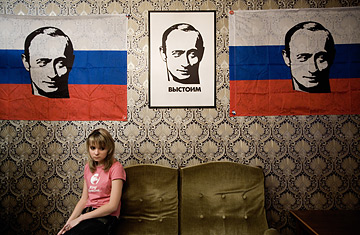
A female member of VV fan club of the Russian president, Vladimir Vladimirovich Putin, sits in a room in Moscow.
Correction Appended: January 4, 2008
"Like a Soviet officer, dammit!" Vladimir slapped at my elbow to make sure my arm was in the commissar-approved position for drinking — elbow out shoulder-high, like that of a soldier marching in front of Lenin's tomb, except with a shot glass at the lips. "To America!" he bellowed, and the three of us drank another round of Johnnie Walker Red at the FEP restaurant in Ostashkov, a drowsy lakeside town in Russia's Tver province north of Moscow.
Vladimir, a state senator in the province, with a buzz cut and a nose as red as fire, sat back down in his seat. A few minutes earlier, we had been in the restaurant's kitchen, watching the cook loosely butcher a massive pike and throw all the parts — head, fins, body, entrails — into a pot of boiling oil. Vladimir was now picking through the platter of fried fish innards. To his left, Sasha, the restaurant's owner, a local businessman built like a boxer, wasn't done with me yet. "Russia should be a strong country. It's better that way, even for our friends in America," he said. And with that, he grabbed my face and planted a vinegary kiss on my cheek.
It was not yet noon on a sunny September morning, and we were only a few hours' drive from the glistening slick of petrodollars that is Moscow. These men are economic and political successes in Vladimir Putin's Russia. But here they were, drinking themselves warm on whisky and eating the fatty innards of a lake predator as if they were ice fishermen from a century ago. It reminded me of something a friend had told me a dozen years earlier in Moscow: in the heart of a Russian, it's always winter.
I had come to the Russian countryside, though, to get beyond proverbs — and beyond Moscow — in search of what Russians like to call the National Idea. It's often said that Russia is truly in trouble when it can't articulate what it stands for. The Soviet National Idea of exporting revolution, conquering space and winning Olympic medals was a strange mix, but at least it was steady. By 1995, the last time I lived there, Russia had disintegrated into a rudderless mess, defined most by a bestial crime rate and Boris Yeltsin's kleptocracy in the Kremlin.
Russia is now resurgent, and the West sees a new menace in all Putin's movements: the way he mocks the U.S. and Europe abroad and strangles democracy at home. But he does so with the full support of the Russian people; to understand their mind-set today is to understand where Russia may be headed. To find Russia's current big idea, I traced the path of a long-dead St. Petersburg customs official named Alexander Radischev. In 1790, the 28th year of Catherine the Great's reign, the middle-aged father of four wrote a book called A Journey from Petersburg to Moscow. In the book, Radischev bundled his experiences from the long carriage ride between the two capitals into a collection of anecdotes and allegories about the condition of his country. It is artless literature, didactic and cringingly sentimental. But its political ideas are astonishing: his sketches of venal bureaucrats, reckless aristocrats and heartbroken peasants formed an unprecedented challenge to serfdom and the monarchy. More than 200 years later, the book remains a staple of Russian education, a sort of Slavic Uncle Tom's Cabin.